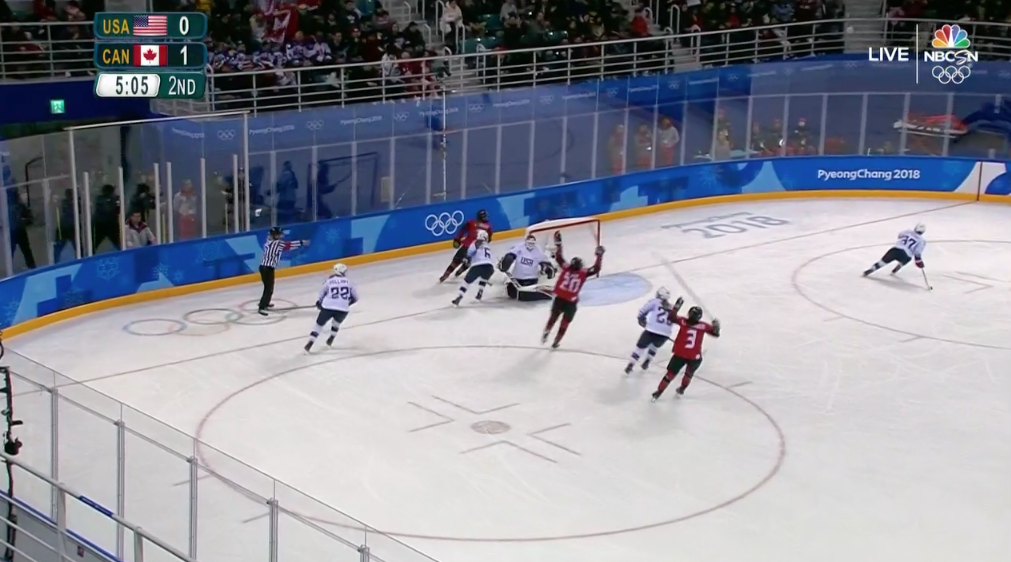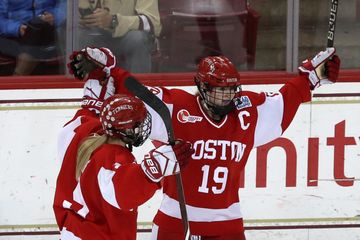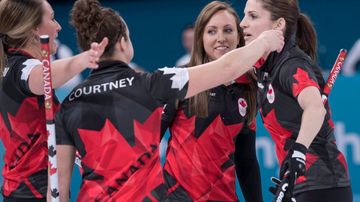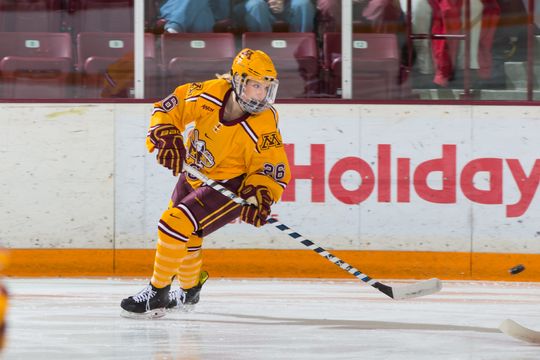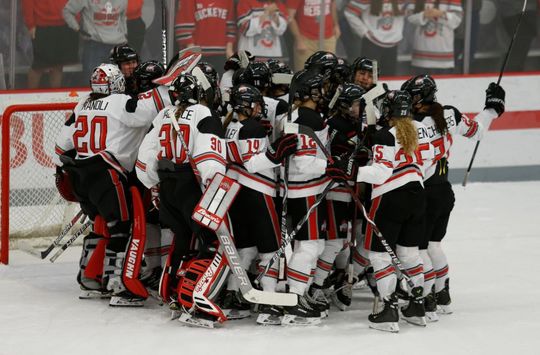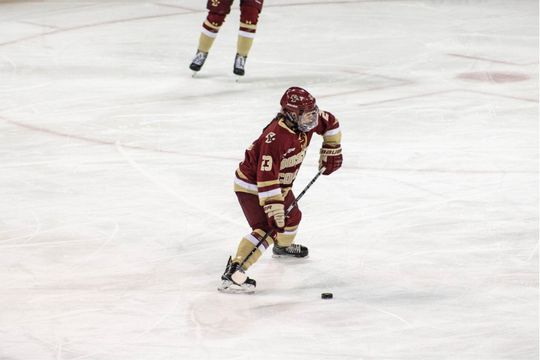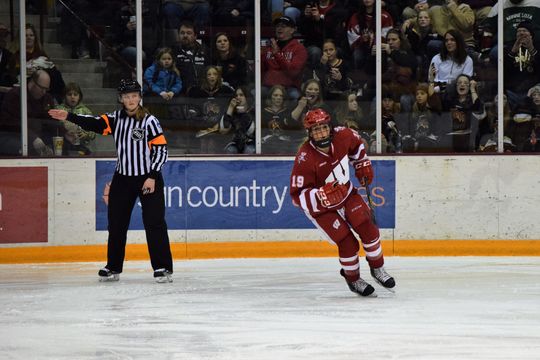Both groups A and B have concluded play, with Team USA and Team Canada earning a bye to the semifinals. The quarterfinals will begin tonight.
Eliminated in Group Play
Team Japan got its first win of the tournament against the unified Korean team, but both were eliminated from Group B because they were the two lowest-ranked teams. (Even though the Olympic athletes from Russia didn't win a single game, they still qualified for the quarterfinals by virtue of being in Group A.)
Team Japan in particular has a lot to be excited about going forward, particularly their closer matchups against Sweden and Switzerland. Japan has strong players at every position and their program remains competitive. They played a disciplined game and had a strong penalty kill during the few times they did end up in the box. Nana Fujimoto's save percentage was in line with her last Olympics appearance -- she hasn't been able to replicate the success she's had at IIHF Worlds tournaments and the NWHL in Olympic Group B play. Better offense will help her out (and her potential successors in net) in giving Team Japan a chance to win.
It's hard to say how the unified Korean team is or isn't indicative of the future of ice hockey in either North or South Korea. South Korea is ranked #17 in the world right now, but also has jumped 5 spots in the IIHF rankings just since last year. Some of that is likely due to their success with imported players like Park Yoon-Jung and Randi Griffin, the latter of whom scored Korea's lone goal of the tournament.
I tend to concur with the conclusions made by ThinkProgress' Lindsay Gibbs regarding the sexist and nationalist implications of the unified Korean team:
"It's not being well received in South Korea, because in some ways it's seen as giving concessions to North Korea," Town said. "The way it was done did not earn them goodwill domestically. These athletes, this was their moment to shine, and it was taken away because of a foreign entity."
Indeed, the South Korean administration did not communicate with the women's hockey team at all before the decision was made, even though the decision meant that some of the South Korean hockey players who had been working so hard to make the Olympic team would no longer get to participate. Additionally, the administration did a very poor job selling the decision publicly, noting it was made because the women's hockey team wasn’t a medal contender.
North Korean athletes certainly deserve the same amount of respect as their South Korean counterparts, but the infantilizing treatment that they were given by broadcasters and journalists did not reflect that respect, and in fact mimicked the dismissiveness afforded to their event by the governments involved in creating this team. NBC, for example, showed the Korean team getting a single scoring chance as an inspirational highlight, packaged as a single video with dramatic music, rather than as part of a picture of the entire game.
South Korea definitely has a shot at continuing to improve their IIHF ranking to the point that they make it out of Division IB. They are right on the cusp of ranking high enough for Division IA and perhaps having a shot to play directly in Olympic qualification tournaments in the next Olympic cycle. However, that would highly depend on whether the South Korean governing body of ice hockey is committed to doing so now that their 2018 Olympics are over. In addition, this Olympic tournament by the Korean team is basically a throwaway in terms of IIHF rankings for both North and South Korea -- unless some sort of dispensation is made to allow the team to compete in the IIHF as a unit. Considering the rushed, propagandist nature of this venture, it seems unlikely.
Team USA and Team Canada
The Valentine's Day matchup of the expected gold medal contenders came off as advertised. The tight game had a little bit of everything -- physical play, pretty goals, a penalty shot, a controversial goal, and piles of players in the goal crease.
The scoreless first period was also probably the most even, with Team Canada actually holding a 14-12 shot advantage. It did feature some miscues by Team USA's defensive roster, including somewhat major giveaways by Lee Stecklein and Megan Keller. Both goaltenders were outstanding; Robb Stauber tapped Maddie Rooney for her second-ever Olympic start and Laura Schuler went with Geneviève Lacasse.
The second period was when things started to shift. Meghan Agosta had an outstanding individual shift on a Canadian power play. She rushed the puck up ice from the opposite end, created the zone entry, and had a flurry of chances on Rooney before picking up a rebound on a shot by Natalie Spooner. The shot bounced its way into the net behind Rooney, giving Canada a 1-0 lead.
The Canadians went up 2-0 later in the period on a perfectly placed shot by Sarah Nurse, who shot for the top corner stick side on Rooney through a screen on a 3-on-2 rush. Nurse's goal was later shown to be offside, which is challengeable in these Olympics, but Stauber chose not to challenge and said after the game that he did not think the video he saw was conclusive.
Despite the scoreboard, Canada's performance in this period -- and in the rest of the game -- relied heavily on Lacasse being near-perfect. The second period that gave them the lead saw them heavily outshot by a margin of 18 to 4. The officials also called a penalty shot after Haley Irwin closed her hand on the puck in the blue paint, and Jocelyne Lamoureux-Davidson was chosen to take the shot. She made a nifty move, but Lacasse made an even niftier stick save to prevent the goal.
In the third, they were again outshot 12 to 5. Team USA did get a goal from Kendall Coyne to cut the lead in half, but they were unable to put another past Lacasse.
Team USA should be concerned about some defensive lapses and may perhaps wonder if it isn't time to give Alex Rigsby a shot in goal. While Rooney is an excellent goalie, Lacasse stole a game for Canada outright with her performance, and Rooney allowed two goals that she would probably like to have back.
Team Canada should definitely be concerned about the amount of shots they conceded. They have incredible goaltending, but giving Team USA that amount of shots is never a great strategy to win. They will want to tighten up in the neutral zone and also focus on puck retrieval in the defensive end.
Both teams will want to play a more disciplined game. For Team USA, Hilary Knight and Brianna Decker took unnecessary penalties late in the third period. And considering Marie-Philip Poulin's legendary game-breaking ability, they probably don't want her in the box late in the third period of any game, either, but she did get penalized for interference (only to be released and get a matching roughing penalty with Monique Lamoureux in the final minute of play).
The Olympic athletes from Russia, who have had an abysmal tournament so far, have a tough task ahead of them in their quarterfinal game against Switzerland, who are on a roll and were unequivocally the best team in Group B. So does Sweden against Finland, who steamrolled OAR by a score of 5 to 1.
On Friday night Eastern time at 10:10 PM, the Olympic athletes from Russia will play Switzerland for a chance to move on to the semifinal round. At 7:10 AM Saturday Eastern time, Finland and Sweden will face off for a chance at the same. At the conclusion of the quarterfinals, Team Japan and the unified Korean team will also play classification games against the losers of the quarterfinals to determine their final rankings in the tournament.
